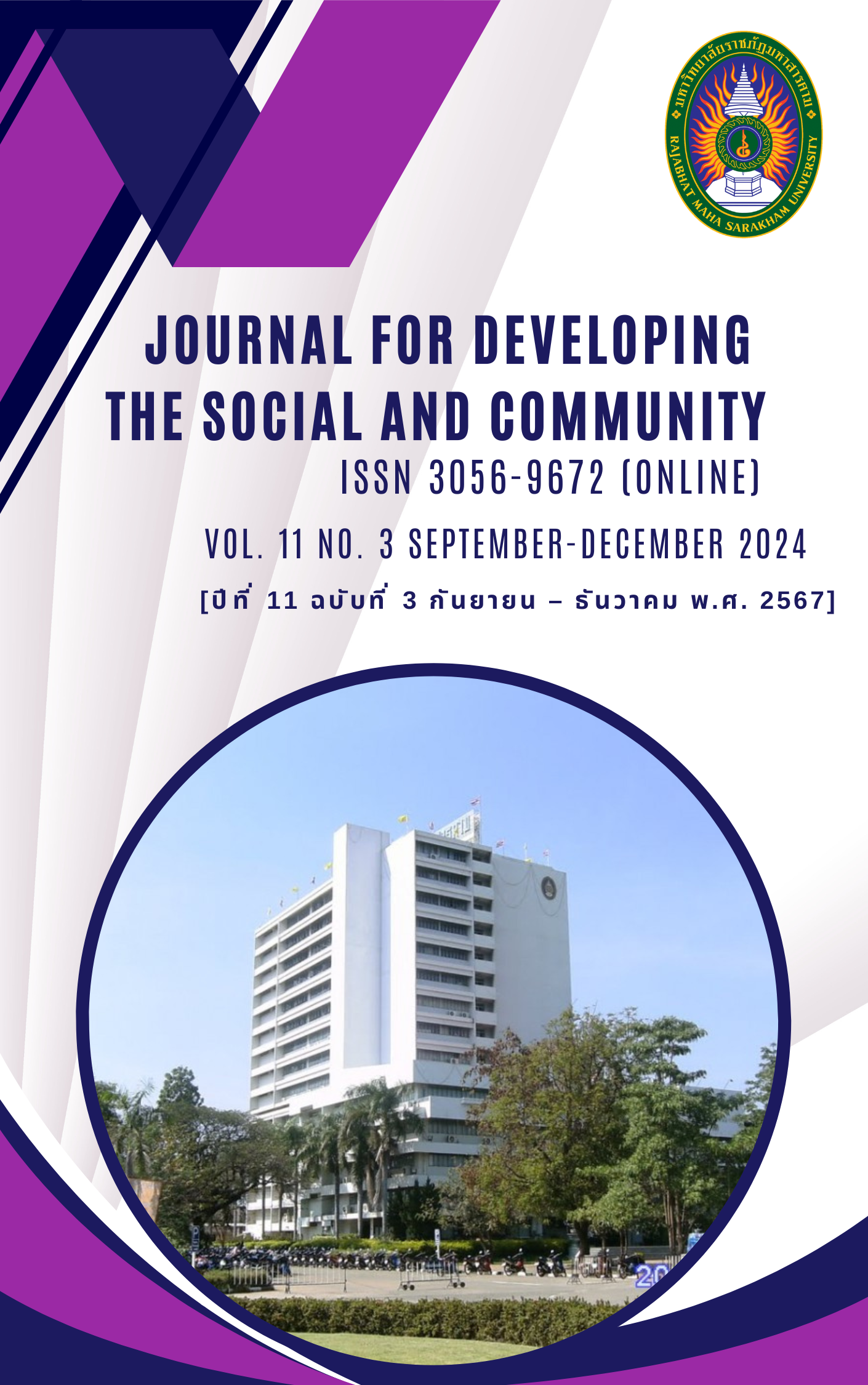Development of Science Learning Activities on " Substance and Properties of substance" to Promote Problem Solving Skills for Sixth-grade Students.
Keywords:
Science Learning Activities, Problem-Solving Abilitie, Learning AchievementAbstract
The objective of this study is to develop learning activities for sixth-grade students centered around the topic of "Substances and Properties of Substances" with the intention of enhancing their problem-solving skills. The research was carried out in three distinct phases: Phase 1 involved reviewing guidelines for designing science learning activities aimed at improving problem-solving abilities. Phase 2 focused on the development of learning activities related to "Substances and Properties of Substances" with the goal of enhancing problem-solving skills among sixth-grade students. Phase 3 encompassed the testing of these learning activities with a group of 18 sixth-grade students from Ban Pho Song Hong Witthaya Community School during the second semester of the academic year 2022. Various research tools were employed, including an interview form, learning plans, a 30-items learning achievement test (with difficulty ranging from 0.43 to 0.67, discriminating power from 0.36 to 0.63, and reliability of 0.97), a problem-solving ability inventory consisting of 24 items (with difficulty ranging from 0.33 to 0.77, discriminating power ranging from 0.23 to 0.47, and reliability of 0.86), and a satisfaction questionnaire. Statistical methods such as mean, standard deviation, percentage, and dependent sample t-tests were used for data analysis. The research yielded the following outcomes:
1) The Science learning activities on “Substance and Properties of substance” to promote problem-solving abilities for sixth-grade students, there are 4 learning plans. The learning activities consisted of 6 steps: (1) problem determination, (2) problem understanding, (3) study and research, (4) knowledge synthesis, (5) summarizing and evaluating the answer, and (6) presentation and evaluate the work, which the appropriate is height level. 2) The sixth-grade students have learning achievement on “Substance and Properties of substance” after learning the activities are higher than before learning statistically significant at the .01 level. 3) The sixth-grade students have problem solving abilities on “Substance and Properties of substance” after learning the activities are higher than before statistically significant at the .01 level. 4) Students were satisfied with science learning activities at the highest level.
References
Amornwiwat, S. (1998). "Do we have to reform learning?" in Reform according to 5 theories. Bangkok: Idea Square.
Arunsukrujee, K. (2003). Cooperative members' satisfaction with the operations of Chaiyapra Agricultural Cooperative Limited. Chai Prakan District, Chiang Mai Province. Thesis, M.Sc. Chiang Mai: Chiang Mai University.
Duangdeewong, W. (2018). Development of academic achievement and problem-solving thinking about materials and their properties. with problem-based learning activities For Grade 5 students. Master of Education Thesis. (science teaching). Chonburi : Burapha University.
Gagne, R. M. (1970). The conditions of learning. (2nded.). Holt, Rinehart & Winston.
Herzberg, F. (1959). The human problem of management. Englewood Cliffs, CA: Thomson/ Wadsworth.
Hmelo, C.E. & Evensen, Dorothy H. (2000). Problem-Based Learning: Gaining Insights on Learning Interactions Through Multiple of Inquiry. Mahwah, New Jersey: Lawrence Erlbaum Associates.
Joyce, B & Weil, M. (1992). Model of Teaching. (3rded). New Jersey: Prentice Hall International, Inc.
Ketkarn, P. (2015). Results of problem-based learning management to develop academic achievement. Science subject Problem solving ability and scientific attitude of students in grade 6. Master of Education Thesis (Curriculum and teaching). Chonburi: Graduate School.
Khaemmanee, T. (2002). Teaching formats: various options. Bangkok: Chulalongkorn University Press.
Nuengchalerm, P. (2015). Learning science in the 21st century. Bangkok: Chulalongkorn University Press.
Office of the National Education Commission. (2002). Office of Educational Policy, Planning and Standards. Religion and culture National Education Plan (2002-2016): Summary edition. (2nded). Bangkok: Phrikwan Graphics Co., Ltd. (In Thai)
Risser, N.L. (1975). Development of an instrument to measure patient satisfaction with nurses and nursing care in primary care setting. Nursing Research, 24 (1), 45-51.
Sansern, C. (2017). Development of learning ability in science subjects. Using problem-based learning of students in grade 5. Master of Education Thesis. (Curriculum and teaching). Bangkok : College of Education Dhurakij Pundit University.
Secretary-General of the Education Council. (2007). Problem-based learning management. Bangkok: Office of the Secretary-General of the Education Council.
Sinthapanon, S., et al. (2012). Develop thinking skills according to educational reform guidelines. Bangkok: Printing Techniques.
Suthirat, C. (2010). Techniques for using questions to develop thinking. Nonthaburi : Sahamit Printing and Publishing.
Wong-iam, S. (2015). Development of academic achievement and the ability to think and solve scientific problems in the Biology subject: Living things and the environment of Mathayom 4 students. Master of Education Thesis Field of study of science teaching. Chonburi: Faculty of Education Burapha University.
Worakham, P. (2022). Educational Research. (13rd ed.). Maha Sarakham : Taxila Printing.
Downloads
Published
How to Cite
Issue
Section
License
Copyright (c) 2024 Journal for Developing the Social and Community

This work is licensed under a Creative Commons Attribution-NonCommercial-NoDerivatives 4.0 International License.
Articles that are published are copyrighted by the authors of the articles







